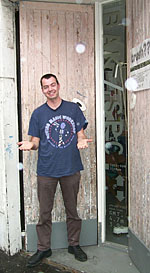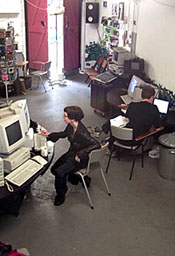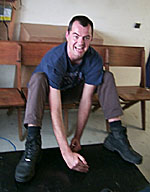The Backspace Project: Creating Equity Over Access
[ No. 34 - August 1999 ]
|
|

|
James Stevens
Proprietor
Backspace.org
London, England
(realaudio clip)
|
"If you don't like the news, go out and make some of your own."
- Scoop Nisker
In our travels we've seen a lot of web-based organizations
gorged on hype. There's money to be made and most everybody
in the Internet business community will do anything to make
it. But what about the community of artists? What about the
actual creative connections the Internet can provide? The old
story of the lowly musician, writing alone at home...how can
she use the Internet to raise herself up to some kind of
visibility or, at least, meet like-minded players?
We've all seen the big portals, search engines and retail sites.
We've seen guys in sport jackets with no musical experience
posture themselves as online messiahs to the largely ignored
independent musician. We've seen hacks-who-would-be-CEOs with
fire in their eyes hot on the spoor of an IPO. But who is
actually creating emotionally and artistically equitable
community (besides your faithful FezGuys)?
Meet James Stevens, proprietor of the Backspace Project in
London, an online access and arts community that exists for no
other reason than to be a community. A combination of the
physical and virtual worlds where artists of all shades can
meet, commune, observe, collaborate, and express themselves.
Created out of shoestring and salvage, the Backspace Project
has become a vital, viable community that isn't interested in
finding The Gimmick that will provide a Quick Cashout in
hypermarketed Internetland.
We catch up to Mr. Stevens between interviews with the BBC and
various European periodicals. He descibes the Backspace Project
and his hopes for success based solely on its own resources.
Peppering his conversation with ear-catching words and phrases
like "slacktivist" and "non-hierarchical representation of the
collective state of mind" he expresses visionary dreams about
a self-perpetuating community based on the fertile ground of
imagination. A place where creative work can "sidestep commercial
and cultural co-option, and the interruption of corporate
concerns."

|
|
Backspace
|
|
All this might sound like a tryptifunk groove looped out of
rehashed political samples from the Marxist utopia at the
beginning of the Twentieth century. But Mr. Stevens displays
a remarkable ability to cull raw materials, power, connectivity,
hardware and even rent out of thin air, intelligently delegating
responsibility for aggregating these resources. He then stands
back, to let the thing succeed or fail on its own terms.
Online and off, Mr. Stevens describes the three year old
Backspace Project as an "under the counterculture" experimentation
with media, tech and "the bits in-between." For £25 (about
$37.00US) per month, as the introductory blurb states, a
Backspace subscriber gets: "activities and interests of
subscribers and friends promoting access, learning, discussion
and development. Subscribers gain a full Internet access
dial-up account, quality access to the Web, an email account
and an open invitation to drop in any time for as long as you
like, come down to events, meet up with friends or just chill
out by the riverside." Mr. Stevens points out that, while there
are many "virtual community" projects available, there are few
that operate in a physical space as well. He observes: "A
physical space means that computers, audio and video libraries,
editing equipment, video projectors, etc...can be brought
together to use." Assembling the nuts and bolts to roll a
going concern requires a lot of legwork. Backspace is funded
entirely by the subscriptions of its users, with a little help
from some synchronous relationships. Situated in a 200 year-old
wharf building on the Thames just west of London bridge,
Backspace thrives in the fragile web of these interdependent
relationships. Web serving is hosted free by
(an originally grassroots, now big time, ISP in Germany that
still appreciates the little guy). 512 kbps connectivity (about
a third of a T1 or quadruple ISDN) is handled by others in the
building who pay for and control the datastreams in exchange
for free access Mr. Stevens handles maintainence and acquisition
of hardware, as well. Having supplied high tech gear to many
of the design and interactive businesses in London, he knows
a lot of people. A sort of telecommunications hardware ragman
who could be said to wander the districts in a cart overflowing
with boxes, wires and advice, he barters and trades his way
through town, generating interest in Backspace by meeting people
and discussing broader interests then merely the Internet.
Physical community is the "keystone activity" of his realm and
"gritty day to day life" comes first. This existence usually
works well for the 37 year old father of two. Though Backspace
has "died two or three times" Mr. Stevens proprietorship emerges
more "sinuous and flexible after each death." The online presence
of the Backspace Project resembles an intriguingly designed,
colorful and spacious virtual manufacturing facility, converted
to digitally airy and well-lit lofts where behind each icon is
a different and colorful gateway to another world. Within the
site can be found many pages featuring audio and video realtime
jamming, resources for creation and manufacture of pirate radio,
and a panoply of art, ideas, diaries, games, lists, suggestions
and rants that remind one of the familiar and welcome feeling
of a large family. It is community in the truest sense of the
word; those at the center sourcing organization and logistics,
users and contributors dropping in and out, and camp followers
and hangers-on, eager to get a word in edgewise in a vital and
energetic civilizational soup of the most fascinating kind.
Mr. Stevens comments: "It's a place where anybody can become
involved and interfere with the system."
What about the audio side of this Rube Goldberg contraption?
Though coming out of a rock and roll background (he started a
booking agency called BRAG and also handled lighting design,
roadie duties, driving, haggling with club owners, dealing with
business, etc...) Mr. Stevens makes clear that, at Backspace,
audio is "as important as anything else." Ninja Tune (a loose
amalgamation of DJs, Samplers, Producers and Remixers) is in
the building, DJ Coldcut (one of the more visible contributors
of the so-called "flip-flop" scene) does some semi-regular
performance and there are numerous ongoing Internet radio
programs. Though only five percent of Backspace content is
audio that figure takes up fully half of the disk space.

|
"The whole point is that people can come and use as much of
the resources as possible," offers Mr. Stevens. "There are
few rules. The main rule is: no one should have to wait more
than half an hour to get on a machine. There are physical
resources on location you can come and use anytime, whether
you come everyday or just visit London occasionally. A person
can join from anywhere in the world, whether they need RealAudio
servers, decent disk space, or just somewhere to put their
ideas into reality. Backspace is a physical space first, but
open to anyone in the world. The online world lacks true
community without a physical space," comments Mr Stevens.
"Backspace is a place to come down and actually interact."
It's a good idea. Imagine a network of physical spaces working
together in which members can share online resources as they
travel around the world.
What does the future hold for the Backspace Project? "There
are half a dozen spin-off sites in Europe," reports Mr. Stevens,
"and we are encouraging more. New sub-domains, new URLs, more
content...we're pushing the space into perpetual transmission
of audio and video streams. It's a pilot space, a collaborative
effort, and hopefully the project will give confidence to
others. As we take on more and more subdomains I expect to
lose control, which is good!"
It's refreshing to remember that hordes of venture capital
locusts don't necessarily make the difference in the perception
of success or failure. Content still takes precedence over
form.
Backspace URLs:
<bak.spc.org/vacuum>
<bak.spc.org/iod/destructo/>
<bak.spc.org/everything>
<bak.spc.org/downlode>
<bak.spc.org/j18>
<bak.spc.org/vt>
Subdomains include:
<sytonia.spc.org>
<rad.spc.org>
Spin-off sites:
<www.lowtech.org>
<www.test.org.uk/>
<www.idea.org.uk/splitshift/>
<www.ohos.org.uk>
<bak.spc.org/gallery37>
<www.irational.org/cube>
<www.okchicken.com/>
The FezGuys welcome your comments.




